
A netbook is a small and inexpensive laptop designed primarily as a means of accessing the Internet. Netbooks were sold from 2007 until around 2013, when the widespread advent of smartphones and tablets eclipsed their popularity.

The Liberty, formally named The Liberty Shopping Centre, is a covered shopping centre in Romford, London, England, the largest such centre in the town. It was originally built in 1968 and underwent a four-year redevelopment completed in 2003. The centre takes its name from the former Liberty of Havering and is owned by the Cosgrave Property Group. It is also the largest indoor shopping centre in the borough of Havering overall and covers 432,000 square feet (40,100 m2) of retail space, around 100 shops.
Linux adoption is the adoption of Linux based computer operating systems (OS) by households, nonprofit organizations, businesses, and governments.
Google Store is a hardware retail store operated by Google that sells Google Pixel devices, Google Nest products, Chromecast dongles, Fitbit devices, and accessories such as earbuds, phone cases, chargers, and keyboards. It also sold Nexus, Daydream, Stadia and Cardboard devices until their discontinuations. Google Store sells products made by Google or made in collaboration with that company. It was introduced on March 11, 2015, and replaced the Devices section of Google Play as Google's hardware retailer. It is overseen by Ana Corrales, who is also the COO of Google's Devices & Services division.
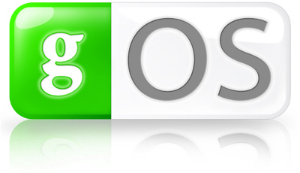
gOS or "good OS" was an Ubuntu-based Linux distribution created by Good OS LLC, a Los Angeles-based corporation. Its CIO David Liu described that after meeting Enlightenment and open source people, he realized that his dream to bring Web 2.0 applications into mainstream use could be achieved by creating a Linux distribution that made it easy for users to access Google and Web 2.0 applications. David Liu went on to create the Chinese Twitter clone called Wozai (我在), leaving gOS officially defunct.
A cloudbook is a class of laptop computer, originally defined as any lightweight laptop with a small solid-state drive (SSD), built-in Wi-Fi, and a minimal operating system configured to prioritize web browsing, web applications, and cloud storage. The concept emerged in 2007 with the cancelled Palm Foleo. In 2010, Google announced a reference design for a cloudbook running the company's ChromeOS; called Chromebook, the first models were released in 2011. Chromebook was a massive success for Google and found widespread adoption, especially in educational markets.
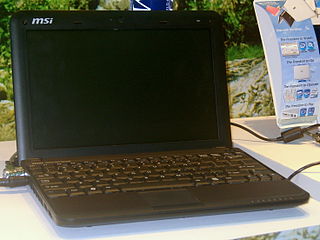
The MSI Wind Netbook was a family of subnotebooks / netbooks designed by Micro-Star International (MSI). Wind stands for "Wi-Fi Network Device". The first model was announced at CeBIT 2008, and first listed for pre-orders on May 9, 2008. While initially 8.9- and 10.1-inch screen versions existed, as of 2010 only the 10.1" remained, with a resolution of 1024 × 600. While most models had 1 GB of RAM, some had 2 GB, and hard disks ranged from 80 GB on the oldest to 250 GB on the newest models. Also featured were Bluetooth, WLAN and a 1.3 megapixel camera. The Wind PC was MSI's response to the successful Asus Eee PC. The keyboard was 92% of full-size.

ChromeOS, sometimes styled as chromeOS and formerly styled as Chrome OS, is a Linux distribution developed and designed by Google. It is derived from the open-source ChromiumOS operating system and uses the Google Chrome web browser as its principal user interface.

Joli OS was an Ubuntu-based Linux distribution created by Tariq Krim and Romain Huet co-founders of the French company Jolicloud. Joli OS is now an open source project, with source code hosted on GitHub.
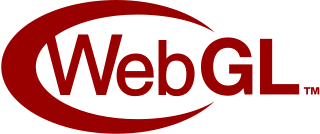
WebGL is a JavaScript API for rendering interactive 2D and 3D graphics within any compatible web browser without the use of plug-ins. WebGL is fully integrated with other web standards, allowing GPU-accelerated usage of physics, image processing, and effects in the HTML canvas. WebGL elements can be mixed with other HTML elements and composited with other parts of the page or page background.
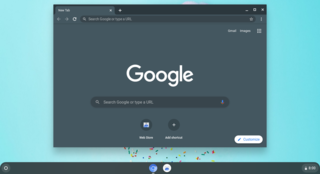
ChromiumOS is a free and open-source Linux distribution designed for running web applications and browsing the World Wide Web. It is the open-source version of ChromeOS, a Linux distribution made by Google.
Chromebook is a line of laptops, desktops, tablets and all-in-one computers that run ChromeOS, a proprietary operating system developed by Google.
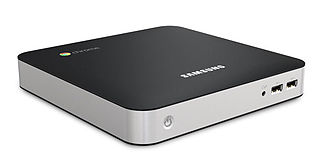
A Chromebox is a small form-factor PC that runs Google's ChromeOS operating system. The first device debuted in May 2012.

The Chromebook Pixel is a 2013 laptop at the high end of Google's Chromebook family of machines, which all come preinstalled with ChromeOS operating system. The Chromebook Pixel is part of the Google Pixel series of consumer electronics. An updated model was released in 2015. Chromebook Pixel stopped receiving software and security updates in August 2018.
Neverware Inc was a New York–based technology company and a subsidiary of Google.

Android Runtime for Chrome (ARC) is a compatibility layer and sandboxing technology for running Android applications on desktop and laptop computers in an isolated environment. It allows applications to be safely run from a web browser, independent of user operating system, at near-native speeds.
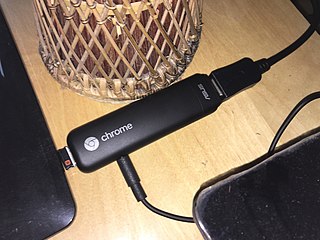
The Chromebit is a stick PC running Google's ChromeOS. It is able to be plugged into any display via HDMI to act as a personal computer. Keyboards and mice are able to be connected over Bluetooth or Wi-Fi. The device was announced in April 2015 and began shipping November 2015.

The Pixelbook is a portable laptop/tablet hybrid computer developed by Google which runs ChromeOS. It was announced on October 4, 2017, and was released on October 30. In September 2022, Google canceled future generations of the product and dissolved the team working on it.

The Pixel Slate is a 12.3-inch tablet running ChromeOS. It was developed by Google and released on October 9, 2018, at the Made by Google event. In June 2019, Google announced it will not further develop the product line, and canceled two models that were under development. The Pixel Slate was removed from the Google Store in January 2021.
The Pixelbook Go is a portable touchscreen laptop computer developed by Google which runs ChromeOS. It was announced on October 15, 2019 as the successor to the Pixelbook, and shipments began on October 27 for the United States and Canada. The Pixelbook Go was later made available for the United Kingdom in January 2020. Unlike preceding Google-branded Chromebook devices, the Pixelbook Go is not considerably more expensive compared to Chromebooks with similar functionality and specifications.










